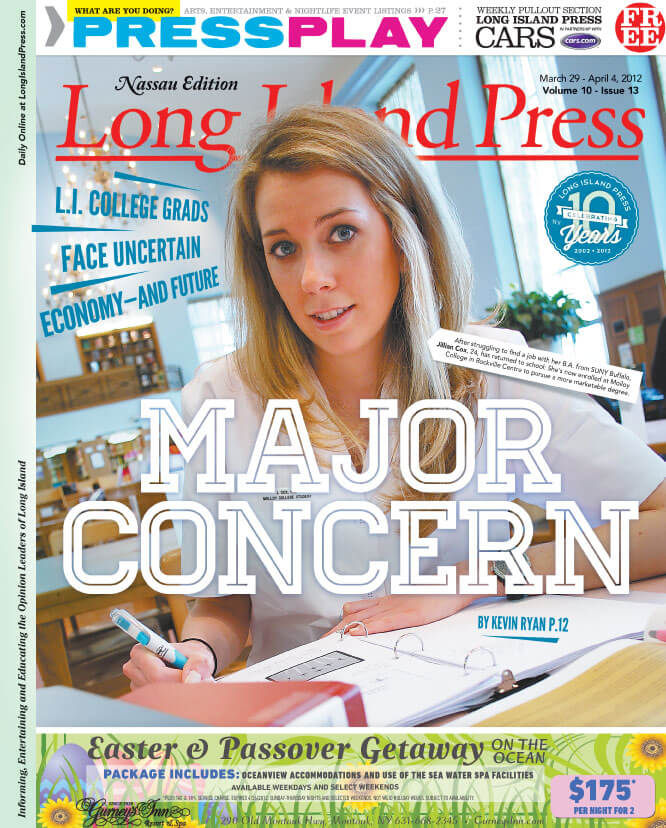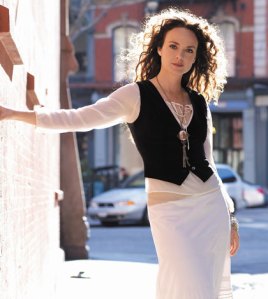Michael Cunha did it all by the book.
He achieved an SAT score in the top 3 percentile nationally. He earned a full scholarship to Hofstra University, maintained a 3.7 grade point average and graduated with honors. He secured a job and less than two years later was paying his own bills and living on his own—age 24 and financially independent.
The job he worked so hard to achieve that set him on a path to his own version of the American Dream? Waiting tables at Olive Garden.
Cunha, like so many other perfectly qualified college grads across Long Island, has had to resort to a way to earn a living that just a few years ago would have seemed both unimaginable and undesirable. Since late 2008, when the ongoing recession became an accepted fact for most Americans, college students have graduated with the fairly depressing knowledge that a crippled economy awaited them. For the class of 2009 and beyond, the idea of nailing down a steady job immediately after commencement has been an unrealistic one; the notion of leaping straight into career-oriented employment, a pipe dream. With the academic year approaching its conclusion, more than 20,000 college graduates from Long Island—many of whom will earn their degrees from the Island’s own 19 colleges and universities—will soon find themselves in a job market still struggling to extricate itself from the Great Recession.
According to a study by the Heldrich Center for Workforce Development at Rutgers University, only 52 percent of employed recent graduates have jobs that require college degrees. And among the classes of 2009 and 2010, just 22 percent describe their first jobs as being a step towards their intended careers.
“I can’t even imagine what you would have to do to get the job you wanted in this economy,” says Cunha, of Ronkonkoma. He graduated in 2009 with a psychology degree and pursued the field for a few months, landing several interviews but no offers. In an impulsive moment en route to one interview, he stopped into the Olive Garden a few blocks from his home, spoke to the manager, and was offered a position within a half hour.
It was tough to turn down. There were pressing needs, like paying his car insurance and phone bills—and hopefully having enough left over to cover a gym membership. He’s been waiting tables and collecting tips and paychecks ever since, and he’s even picked up another waiting gig, at Hurricane Grill & Wings in Hauppauge.
“I’m kind of rolling with it,” he tells the Press recently, relaxing at home after an all-day shift of Italian dinners and countless breadstick baskets. “Depending on how things go, I would like to go back to school someday, but it’s kind of hard to imagine doing that soon with the economy the way it is.”

Cunha’s predicament is far from unique—20-somethings across Long Island share his uneasy sentiments. When the National Bureau of Economic Research officially declared that the U.S. was in a recession back in December 2008, it meant that college students would have to gear themselves up for a period of uncertainty that would last for an undefined amount of time. The real world that loomed was merely an in-between, a purgatory for those stuck between college and a career. Only 12 percent of the class of 2009 graduated with jobs already lined up, according to the National Association of Colleges and Employers—an especially staggering statistic considering that the same figure was at 33 percent two years earlier. For the rest, the choices were generally unappealing: Take the first thing available or risk staying unemployed for a long, long time.
Some, like Evan Goldfarb, 23, have already dealt with both. The Massapequa resident graduated from the University of Florida in December 2009 with a degree in finance. Within three months, he was fortunate enough to find work, albeit at a lower salary than he would have hoped, and in an only slightly related field—at a collection agency. Such were the necessary drawbacks of having a steady paycheck, or so he thought.
When his company restructured last March, he was let go. More than a year later, he is still unemployed. He has used a variety of networking contacts within the finance sector, but none of them have panned out yet.
“At one of the jobs I applied to, I was told that it was basically an entry-level position, yet they got 150 applicants for it, some with five to 10 years of financial services experience,” he says. “These people are applying to entry-level positions because they got laid off from their jobs, so they’re looking for whatever they can find.”
His experience is a common one, according to Barbara Ray, author of Not Quite Adults as well as an upcoming book about the effect of the recession on young people. “There are so many older, experienced workers who are clamoring for jobs with young adults,” she says. “There are a lot of young people who have jobs that they may be overqualified for.”
Perhaps most worrisome, says Ray, are the consequences that an unfortunate graduation year can have in the long term. In a 2010 discussion with The Atlantic, economist Lisa Kahn cited a study in which she tracked the career paths of students who graduated between 1979 and 1989. As might be expected, those who entered the workforce in particularly bad recession years—in this case, 1981 and 1982—could anticipate earning an average of 25 percent less in their first year than those who graduated in better times. But the economic effects lasted past that first year and, in many instances, well beyond a decade: 17 years after graduation, those who entered the workforce in the worst years were still earning 10 percent less than their more fortunate counterparts.




























